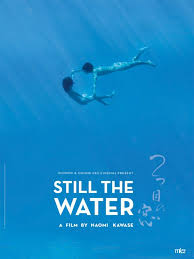
STILL THE WATER
Japan, 2015, 121 minutes, Colour.
Directed by Naomi Kawase.
Still the Water is a film by the celebrated Japanese director, Naomi, Kawase. Set in a provincial coastal town, it focuses on rituals, ceremonials, and a local woman as a shaman.
The film is also contemporary in its look at characters and their relationships, the film opening with a dead body washing ashore and discovered by an adolescent boy.
Complications arise concerning the boy and his family, the sexual behaviour and promiscuity of his mother, his father having moved to Tokyo – and the boy travelling to Tokyo to bond with his father, quite moving sequences. The boys is also emotionally involved, still at school, with a fellow student who is the daughter of the local shaman. Her father owns a restaurant which the young couple frequent.
While the mystery of the dead body is cleared, the film is more a study of the people concerned, especially the younger people and their interactions in the contemporary world, growing sexual awareness, especially in a final water scene, but also the adults and their coping with broken relationships and with death.
1. The work of the director? Her career, Japanese stories, Japanese sensibility, French collaboration?
2. The style, the narrative, characters, imagery, political aspects, contemplative aspects, silences?
3. The musical score, the local songs?
4. The title, the range of water seen? Turbulent and still? Death, life?
5. The introduction, the death of the goat, the ritual, the blood soaking, for the celebration? The goat hanging? the repeat of the sequence – with Kaito?
6. The dead body on the shore, the storm, the naked body, the tattoos, the wife looking at the body, Kaito finding it? The police and the cordon? The teacher at school, forbidding the children to go to the water, to swim? Kyoko in her clothes, swimming, her chatting with the old man?
7. The celebration, the people, the rituals, Japanese tradition? Feasts, the moon? Talk about the Shaman?
8. Kyoko at school, with Kaito, liking him, the swim, bike riding with him, the cafe and eating, her father’s cafe, her sick mother, the Shaman? Riding the bike, Kaito saying she was heavy, falling off? The doctor, the news of her mother’s health, the father and his grief, talk about the shaman and the gods, her mother, in bed, the view of the trees? Love and devotion, the visitors? The singing, the vigil, her final words, summoned by her mother? Grief?
9. Kaito, at home, his mother always out, his father in Tokyo, finding the body, seeing his mother and recognising the man, seeing his mother’s encounter in his dreams? At school, Kyoko, liking her, her advances and his refusal? The bike rides, saying she was heavy?
10. Going to see his father, his mother’s permission, the visuals of Tokyo, the father saying it had energy, the story of the marriage, the separation, issues of fate and love? The father leaving, his tattoo business, his clients and phone calls, his wanting to paint? Going out with his son, sharing the city, bonding with his son?
11. Kaito in his confusion, challenging his mother, refusing Kyoko’s advances, walking along the beach, the fear that his mother was dead, Kyoko at the beach, bringing him to the restaurant, with her father, his reassurance? Wet, talking, at the restaurant, seeing his mother, the reconciliation and is learning?
12. The sexual encounter with Kyoko, the naked swim in the still waters? Transition, adolescents, the different generations, parents, marriage and love, separation, death?
13. A future for the young couple?